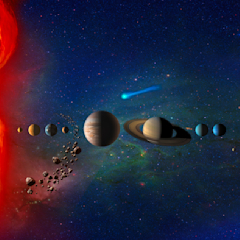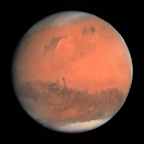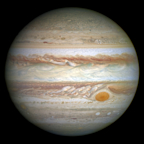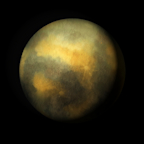Search results
The Solar System [d] is the gravitationally bound system of the Sun and the objects that orbit it. [11] It was formed about 4.6 billion years ago when a dense region of a molecular cloud collapsed, forming the Sun and a protoplanetary disc.
We call it the solar system because it is made up of our star, the Sun, and everything bound to it by gravity – the planets Mercury, Venus, Earth, Mars, Jupiter, Saturn, Uranus, and Neptune; dwarf planets Pluto, Ceres, Makemake, Haumea, and Eris – along with hundreds of moons; and millions of asteroids, comets, and meteoroids.
2 days ago · Solar system, assemblage consisting of the Sun and those bodies orbiting it: 8 planets with about 210 known planetary satellites; many asteroids, some with their own satellites; comets and other icy bodies; and vast reaches of highly tenuous gas and dust known as the interplanetary medium.
An overview of the history, mythology and current scientific knowledge of the planets, moons and other objects in our solar system.
Aug 30, 2017 · How many planets are in the solar system? How did it form in the Milky Way galaxy? Learn facts about the solar system’s genesis, plus its planets, moons, and...
Learn about the different planets in our Solar System. Find out their size, temperature and distance from the Sun in this Scotland Second Level Science article.
Mar 27, 2019 · The solar system, explained. Our solar system is made up of the sun and all the amazing objects that travel around it. The universe is filled with billions of star systems. Located inside...
Our solar system includes the Sun, eight planets, five dwarf planets, and hundreds of moons, asteroids, and comets.
Our solar system consists of our star, the Sun, and everything bound to it by gravity – the planets Mercury, Venus, Earth, Mars, Jupiter, Saturn, Uranus, and Neptune; dwarf planets such as Pluto; dozens of moons; and millions of asteroids, comets, and meteoroids.
Solar System: Exploration. Humans have studied our solar system for thousands of years, but it was only in the last few centuries that scientists started to really figure out how things work. The era of robotic exploration—sending uncrewed spacecraft beyond Earth as our eyes and ears and senses— only started in the 1950s.



















